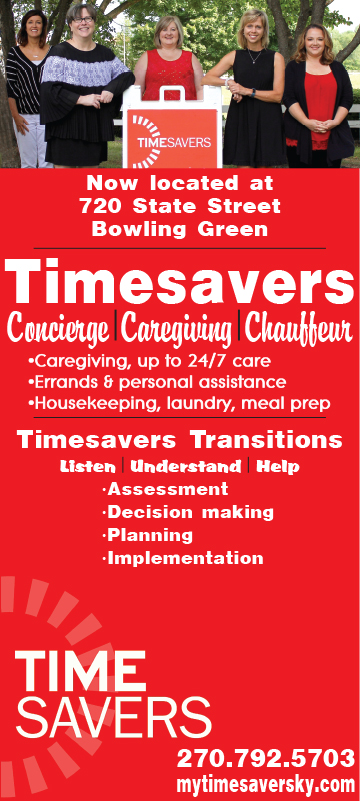
Just as death is part of everyone’s life, it is also part of the cycle of caregiving. At Timesavers, we journey with families from the first signs of balance issues or cognitive decline, to the period in which the introduction of a care team is welcome, to the time when we realize care will always be needed, to the final steps of someone’s life here on earth. We become invested in the quality of a life and the connections we can help a family sustain with each other and those we can help a client create and sustain with the world around them. When any individual journey ends, we are saddened.
Last month one of our first clients overcame her struggle with Alzheimer’s and became whole and at peace. She was not only the mother of our owner and co-founder but also an example to all of optimism, determination, commitment, faith, and a belief that everyone has a purpose in life. If she could help someone find that purpose and live to their potential in fulfilling it, she had lived her purpose. And she did exactly that.
As many tears as we shed when this precious soul left us, we were reminded that our job for a family does not end at death. There are many ways we are needed to support a family during the time of funeral planning and coordination, as well as working with them in checking off all of the to-do items that seem to materialize out of nowhere when someone passes away.
Part of our purpose is to remain available for a family as long as the slightest need exists. As a tribute to our sweet client, and in furtherance of living part of our purpose, we would like to suggest some steps that might make things more manageable when a loved one dies.
Have a conversation with your loved ones early on about what they want their funeral, memorial service, wake, or celebration of life to look like. While this conversation might seem depressing or frightening or unwelcome, you might be surprised that your loved one has strong opinions about what the service should include. You might also be greeted with stories and memories you’ve never heard told. This dialogue, once the door is open, can lead to a closeness and understanding between family members that would not have been possible if everyone remained hesitant or fearful of discussing what is inevitable for all of us.
Keep a written or electronic record of your loved one’s wishes. If there may be disagreement between family members, you might video the discussion with your loved one in order to clearly delineate what they want. Whether or not you are a list person, make a list of the calls and tasks that will have to be completed in order to facilitate the logistics of a funeral service. These things normally must happen on a relatively short timeline and include…
- Which
funeral home should be contacted?
- Are there advance arrangements already in place? If not, which cemetery or columbarium should be visited?
- Will there be services or ceremonies out of town? Who is the contact person?
- Who will contact extended or out of town family members and close friends?
- Will anything be put on social media and when should that occur? This point is emphasized because individuals feel differently and strongly about social media and its place in the world. Families should respect each other’s opinions on this front and never act in a way that could be perceived as exploitative. Your loved one’s wishes should be strongly considered.
- Will an obituary be written in advance and who will write it? Which newspapers or other media sources should be contacted? (On a personal note, we would encourage you to begin the obituary-writing process in advance. This is an unmatched opportunity to learn more about your loved ones and to allow them to see their lives encapsulated and to embrace the legacy they will leave behind.)
- Who will be the officiant?
- Who will sing and do they have the music within reach?
- Who will read what scriptures or poems? Are printed copies available for them?
- Will the service include communion and can the venue be prepared for that?
- Will there be video or a photo board? In whose possession are those pictures? Is someone available to put together these things? Is the venue video friendly?
- Will there be a printed program separate from that normally provided through the funeral home or church? Who is the point of contact?
- Is the deceased a veteran? Will there be a military component to any service? Who needs to be contacted?
- Will there be a graveside service? Will it be private?
- Will food be brought in for the family during visitation and after the service?
- Where should any floral tributes be taken after the service?
- Where should donations be made in memory of the deceased? Who is the point of contact at those organizations?
This is merely the beginning of the process. There are many more boxes to check and calls to make and documents to locate. But this is a start, and it is a part of the planning that can respect what your loved one wants and will allow you to learn more about their life. We all have a purpose. At Timesavers, we hope fulfilling our purpose proves to be of value to you.
– by Elizabeth Downing
About the Author: Elizabeth Downing is Director of Outreach for Timesavers Concierge, Caregiving & Chauffeur. A 1982 graduate of WKU, Elizabeth found her passion in advocating and providing care for older adults and those with special needs. Timesavers seeks to raise awareness of issues relating to aging and caring for aging loved ones, and works to provide the highest quality care available. Elizabeth has completed a Certificate in Care Management from Boston University, is a Teepa Snow PAC Certified Independent Consultant, and facilitates a family caregiver support group each month.




